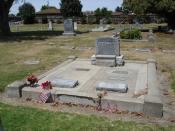Discuss George's actions at the end of the novel. How can we justify what he does to Lennie? How can we condemn it?
Although murder is morally incorrect, mercy killing can be justified as it may prevent a later inevitable and painful death. In the novella 'Of Mice and Men' written by John Steinbeck, the character George shoots his friend, Lennie. Whilst George's actions can be condemned, George had good intentions towards the death of his friend. Steinbeck makes it clear throughout the novella that although horrid incidents may occur such as Lennie's death that it was how it was during the Great Depression. However one may like to condemn George's actions in shooting his only friend, George had forgivable intentions as to why he chose to shoot Lennie.
George's murdering of his friend was without malicious intent. It is clear from the start in the novella that George cares for Lennie, as he protects and looks out for him.
Killing Lennie was not an easy choice.. He also prevented a further painful and torturous death for Lennie, as Curley plans to 'shoot that big bastard's guts right outta him.' This implies that Curley intends no mercy and an excruciating death awaits Lennie. By shooting his friend, George gives Lennie a peaceful death. During the scene where the two men are in the bush, George once again recites their dream which reminds the audience and Lennie of their friendship. He tells George, 'I got you an' you got me.' This conveys in the idea that George truly cared for Lennie and has no vicious intent when he is to shoot Lennie. By shooting Lennie, George gave him a merciful and peaceful death with no intended malicion.
The murder of Lennie is justified as Steinbeck shows the audience...


